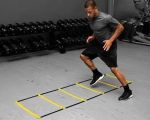The Impact of Sleep on Fitness Performance
Understanding the Link Between Sleep and Fitness
As someone who has always been passionate about fitness, I’ve learned the hard way how important rest is when it comes to achieving peak performance. For years, I followed a strict workout routine, pushing myself to the limit, but no matter how hard I trained, I couldn't seem to hit the fitness goals I set for myself. Then, I realized something crucial: my sleep habits were holding me back. Like many others, I had overlooked the essential role sleep plays in fitness performance. We often focus so much on exercise and nutrition, but sleep is the secret weapon that can significantly enhance our results.
In recent years, more and more research has highlighted how deeply sleep affects physical performance, muscle recovery, endurance, and even mental focus during workouts. It's no longer just about the amount of sleep you get; it’s about the quality of that sleep and how your body uses that time to repair, restore, and prepare for the next day’s challenges. In this article, we’ll explore how sleep impacts fitness performance, why it’s so critical, and what you can do to optimize your sleep for better results in the gym.
1. Sleep and Muscle Recovery
One of the biggest impacts of sleep on fitness performance is its role in muscle recovery. I’ve found that no matter how intense my workouts were, I never saw significant muscle gains until I prioritized quality sleep. During sleep, especially during the deep stages of non-REM sleep, your body enters a state of repair. This is when muscle growth occurs, as the body synthesizes proteins to rebuild the microscopic tears that form in muscles during exercise. Without enough sleep, this repair process is delayed, leading to slower recovery and potentially overtraining.
Sleep also boosts growth hormone secretion, which plays a significant role in muscle repair and regeneration. Growth hormone is released primarily during deep sleep stages, meaning the longer and deeper you sleep, the more growth hormone your body produces. This is why getting 7-9 hours of uninterrupted sleep each night is crucial for anyone looking to build muscle or improve strength. I’ve personally noticed that on nights when I get adequate sleep, I feel less sore after workouts and experience faster recovery times, allowing me to train harder and more frequently.
2. Sleep and Energy Levels
Anyone who’s ever worked out after a poor night’s sleep knows the feeling—fatigue, sluggishness, and a lack of motivation. Sleep deprivation directly affects your energy levels, making it harder to perform at your best. The body relies on sleep to restore glycogen levels, the primary source of fuel for muscles during high-intensity workouts. Without sufficient rest, glycogen stores become depleted, and your body struggles to perform at optimal levels. As a result, you may find yourself unable to complete your workouts, unable to lift as heavy, or feeling mentally foggy and unfocused.
During my fitness journey, I noticed a marked difference when I started getting more sleep. On days when I was well-rested, I felt more energized and had more stamina during my workouts. This was especially important for endurance training, where sustained energy is key to achieving goals like long-distance running or cycling. When you don’t get enough sleep, your body’s energy levels are compromised, leading to poor performance, slower progress, and even an increased risk of injury due to fatigue.
3. Sleep and Mental Focus
While physical performance is essential, mental focus is just as important in achieving fitness goals. I’ve found that sleep is a powerful tool in maintaining the mental clarity and concentration needed during workouts. When we sleep, our brain processes the information we’ve accumulated throughout the day, consolidating memories, improving learning, and enhancing cognitive functions. This means that the better your sleep, the sharper your focus will be when it’s time to hit the gym.
Without enough sleep, our cognitive abilities decline, leading to reduced concentration and poor decision-making. This can affect everything from maintaining proper form during weightlifting to making quick decisions during sports. In my own experience, a lack of sleep has led me to feel mentally exhausted, making it harder to stay motivated or engaged in my workouts. However, when I’ve gotten a good night’s rest, I’ve noticed that my focus during training is much sharper, and I can push myself harder and more effectively.
4. Sleep and Hormonal Balance
One of the less talked about but equally crucial aspects of sleep’s impact on fitness performance is its effect on hormonal balance. Hormones like cortisol, testosterone, and insulin are all influenced by the amount and quality of sleep you get. Cortisol, often referred to as the stress hormone, can rise significantly when you don’t sleep enough. This can lead to increased fat storage, higher levels of stress, and poor muscle recovery. On the other hand, sleep helps regulate cortisol, lowering its levels and allowing your body to recover more effectively from intense workouts.
Testosterone, a hormone essential for muscle growth and fat loss, is also highly influenced by sleep. Studies have shown that testosterone levels are highest in those who sleep at least 7-9 hours a night. For anyone looking to improve their muscle mass or athletic performance, getting sufficient sleep can significantly boost testosterone levels, providing the body with the optimal hormonal environment for growth and strength. In my own training experience, I’ve noticed that when I get adequate sleep, I’m able to lift heavier and feel stronger overall due to improved hormonal balance.
5. Sleep and Immune Function
Another benefit of sleep that directly impacts fitness performance is its role in supporting the immune system. When you’re training intensely, your body undergoes physical stress, which can weaken the immune system and make you more susceptible to illness. Sleep is a critical time for the immune system to repair itself and strengthen defenses against infections. During deep sleep, the body releases cytokines, proteins that help fight inflammation and infection. Without enough sleep, your immune system becomes compromised, increasing your risk of illness and slowing down your recovery from workouts.
In my own experience, I’ve found that when I don’t get enough sleep, I tend to catch colds more easily, and my body takes longer to recover from tough workouts. But when I consistently get enough rest, I feel more resilient and have fewer interruptions in my training due to illness. This highlights just how important sleep is not only for fitness but for overall health and well-being.
6. Tips for Optimizing Sleep to Boost Fitness Performance
Now that we understand how critical sleep is for fitness performance, let’s talk about how to optimize your sleep to get the best results. Here are some of the tips I follow to ensure I get the most restorative sleep possible:
- Stick to a Regular Sleep Schedule: Going to bed and waking up at the same time every day helps regulate your body’s internal clock, improving the quality of your sleep.
- Create a Relaxing Bedtime Routine: Avoid stimulants like caffeine and screens before bed. Instead, unwind with relaxing activities like reading, stretching, or meditating.
- Make Your Sleep Environment Comfortable: A cool, dark, and quiet room promotes better sleep. Consider investing in a comfortable mattress and pillow for maximum support.
- Avoid Overtraining: While exercise is important, overtraining can lead to burnout and disrupt your sleep. Be sure to balance intense workouts with adequate rest days.
- Use Supplements Wisely: Natural sleep aids like magnesium, melatonin, or valerian root can help improve sleep quality, but always consult with a healthcare professional before using them.
By following these tips, you can create the optimal conditions for restorative sleep, ultimately boosting your fitness performance and helping you reach your goals faster.
Conclusion: Sleep is Key to Fitness Success
After incorporating these sleep practices into my own routine, I’ve seen a remarkable improvement in my fitness performance. I’m able to recover faster, push myself harder, and stay more focused during workouts. Sleep is truly a game-changer, and if you’re serious about improving your fitness, it’s time to start prioritizing it. Remember, fitness isn’t just about working hard in the gym—it’s about taking care of your body inside and out. So, the next time you plan your fitness routine, don’t forget to include enough time for sleep. It’s the secret weapon that will help you reach your full potential and achieve lasting results.








